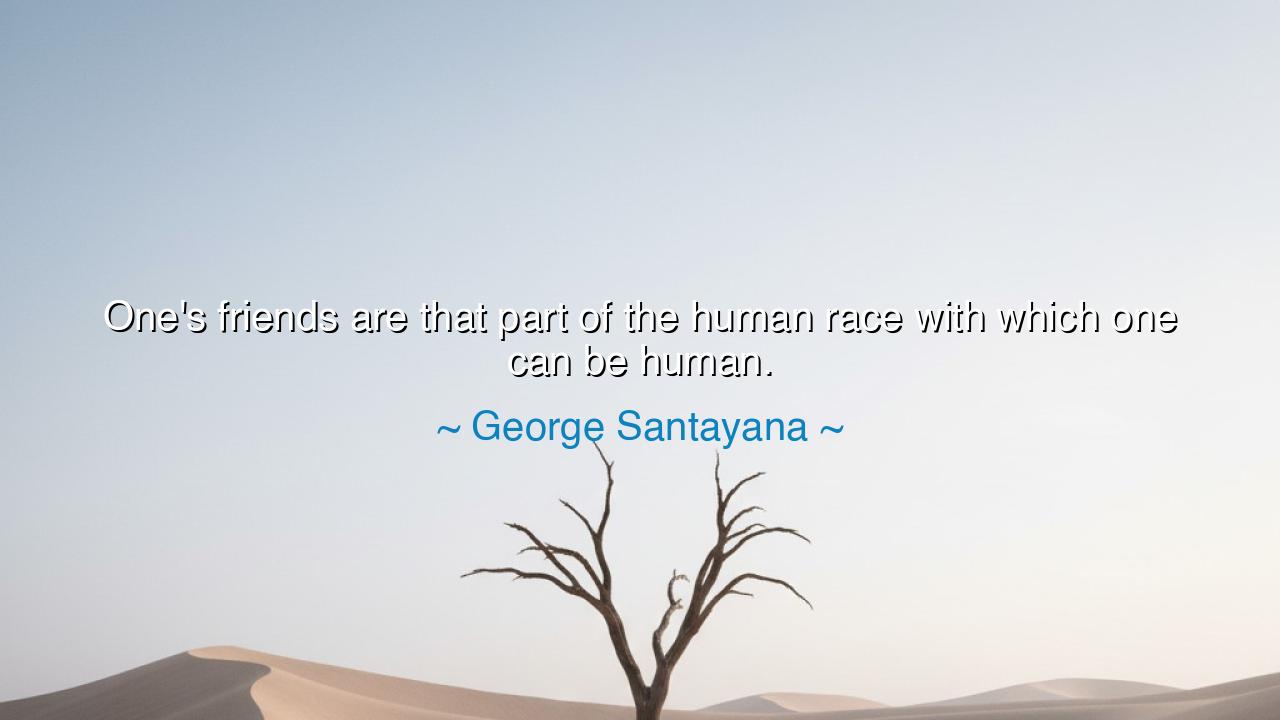
One's friends are that part of the human race with which one can






“One’s friends are that part of the human race with which one can be human.” Thus spoke George Santayana, the philosopher-poet whose words echo with the serenity of understanding and the warmth of lived truth. In this single sentence, he captures the sacred essence of friendship — that it is not merely association or companionship, but a sanctuary for the soul. For in a world that demands masks, manners, and measured words, the presence of a true friend allows us to set aside our armor and stand revealed — flawed, tender, honest, and wholly human.
To be human is to feel deeply — to laugh, to weep, to doubt, to dream — yet how seldom the world allows it. In the courts of power, men are cautious; in the streets of labor, they are guarded; even within families, the weight of expectation bends the heart toward restraint. But in the company of friends, the burden lifts. There, one may stumble and not be shamed, may speak foolishly and still be loved. Friendship, then, is the sacred circle where sincerity is safe, where our humanity, with all its brilliance and blemish, is not judged but embraced.
Santayana’s words were born of both philosophy and solitude. He lived much of his life apart from the crowds, seeking wisdom in reflection rather than acclaim. Yet he understood that no wisdom, however profound, could replace the warmth of understanding between souls. For man is not meant to dwell forever in abstraction; he must, at times, return to the simple grace of connection. A philosopher may dwell among ideas, but a friend dwells among hearts. And when one finds a friend who accepts both one’s greatness and one’s weakness, one has found not merely comfort, but truth — for in that reflection, one sees oneself as one truly is.
Consider the story of C.S. Lewis and J.R.R. Tolkien, two scholars whose friendship transformed literature itself. They were men of intellect, each absorbed in his craft, yet it was through friendship that their humanity flourished. In their long walks and earnest debates, they challenged each other’s doubts, encouraged one another’s visions, and shared not only their art but their fears. Lewis once said of Tolkien that he owed him more than he could ever repay — for it was through their friendship that his spirit was awakened. They were not rivals in intellect, but companions in humanity, reminding each other that even the loftiest minds must still be fed by the warmth of human understanding.
This is the power Santayana names — that friends are the mirror in which our humanity reflects itself clearly. Without them, the soul grows cold and distant, like a statue admired but unliving. With them, life regains its color and movement. To share laughter with a friend is to remember joy; to weep with them is to remember compassion. In the silence of mutual understanding, one feels not isolated, but whole. For a friend does not demand perfection — only presence. They see us not as the world demands we appear, but as we truly are: creatures striving, erring, and loving beneath the fragile veil of pride.
Even in the ancient world, the wise knew this truth. Cicero, writing in his De Amicitia, declared that friendship is “the agreement of all things human and divine.” He meant that friendship lifts us above the pettiness of self and restores to us the fullness of being. It teaches us patience, forgiveness, humility — the great virtues that make humanity beautiful. Through the grace of a friend, the proud become gentle, the lonely become known, and the weary find rest. Thus, friendship is not an ornament to life, but its sustenance, for it is through another’s eyes that we learn to see our own soul with compassion.
Therefore, my child, remember this lesson well: seek friendships not for gain or glory, but for truth. Choose those before whom you need wear no mask, before whom your laughter is unmeasured and your tears unashamed. Be that same refuge for others — the friend who listens without judgment, who cherishes sincerity above charm. For the privilege of being human lies not in wealth or wisdom, but in the sharing of hearts that understand one another.
And so, let Santayana’s wisdom guide you through the ages: that amidst the vastness of the human race, it is friendship that grants us the rare gift of being truly ourselves. When you find such souls — those with whom you can be weak, foolish, joyful, or sorrowful — guard them well. For they are not merely your friends; they are the very proof that you are alive, that beneath the masks of the world, you are still gloriously, vulnerably, and profoundly human.






AAdministratorAdministrator
Welcome, honored guests. Please leave a comment, we will respond soon